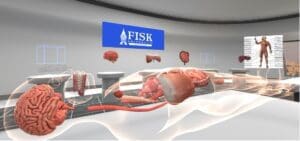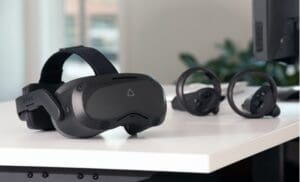Fisk University, HTC VIVE, T-Mobile and VictoryXR Launch 5G-Powered VR Human Cadaver Lab
NASHVILLE, Tenn. — August 3, 2021 — This fall students at Fisk University will attend in-person classes at one of the first virtual reality (VR) campuses in the nation. Fisk University, HTC VIVE, T-Mobile (NASDAQ: TMUS) and VictoryXR have teamed up to launch a first-of-its-kind interactive 5G-powered VR human cadaver lab for students in pre-med and biology-related majors.
Fisk University, located in Nashville, Tennessee, is one of the top ranked HBCUs in the country. This new model of learning combines the in-person classroom experience with 5G-powered VR technology, enabling students to explore the complete skeletal structure, muscle structure and the eleven human organ systems while still engaging in-person with their classmates and instructors.
“We’re combining the best aspects of virtual and in-person learning, and this is the future of education,” said Dr. Vann Newkirk, President, Fisk University. “Fisk University is emerging as a tech leader among colleges, and our effort to bring a virtual reality cadaver lab to campus exemplifies our commitment to provide students with a state-of-the-art education.”

Inside the lab, students will examine the internal organs of various human systems, and the professor can even remove the organs from the body and pass them around for students to hold and open. Students will have the ability to enlarge the organ to a size large enough where they can even step inside to better learn how it works. In addition to organ systems, the cadavers will also include complete skeletal and muscle structures.
“With this cadaver lab, our pre-med students will no longer need to rely on other universities for advanced anatomy and biology classes,” said Dr. Shirley Brown, Dean of Fisk University. “Virtual reality technology takes our university to a level equal to the most advanced schools in the country.”
In the past, Fisk University has not purchased cadavers due to the high cost and maintenance. But with a virtual cadaver lab, the university can offer state-of-the-art scientific learning that’s affordable and easy to maintain. Virtual cadavers do not degrade, and over time additional specialties can be added to the software such as surgical procedures, comparative learning between human and animal as well as microbiology at the cellular level.
In addition, the collaboration will enable Fisk University to offer in-person VR history courses allowing students to visit locations previously only seen in a book or video. Some of those places include key civil rights locations such as the Montgomery Bus Boycott, the Edmund Pettus Bridge in Selma, Alabama, the Lorraine Motel in Memphis, Tennessee, and the National Mall in Washington, D.C.
“The rise of virtual reality is redefining the classroom,” said Steve Grubbs, CEO, VictoryXR. “Remote learning is broken and VR campuses enable professors and students to again come together to teach, learn and solve problems.”

5G-Powered VR Learning
Students will use HTC VIVE headsets to work inside the virtual cadaver lab developed by VictoryXR using the Unity real-time 3D platform. The VR cadaver lab runs on T-Mobile’s Ultra Capacity 5G network, which provides the low latency, high capacity and speed needed to run a bandwidth-intensive VR application for a classroom of students simultaneously. With T-Mobile 5G, the experience offers higher definition graphical detail, making it possible for example to better discern veins and arteries. Meanwhile the low latency of 5G keeps the experience concurrent for multiple users, making sure the whole class stays in synch.
The All-in-One HTC VIVE Focus 3 combines high-definition visuals, superior audio, and next level inside-out tracking and controllers to deliver extraordinary learning experiences. With best-in-class graphics and software, the HTC VIVE Focus 3 enables seamless remote collaboration and incredibly effective training opportunities.
“Advancements in our hardware and 5G networks enable us to power more immersive and engaging learning experiences for students in ways we never imagined,” said Nigel Newby-House, Vice President, HTC Operator Solutions. “We’re excited to collaborate with Fisk University to help pioneer this innovative new model for learning.”
With high-bandwidth, low-latency networks, classrooms of the future will engage students in immersive experiences using mixed reality content. A typical day of learning might include a virtual tour inside the human body, an exploration of the Louvre, a hike across the Amazon rain forest and a lesson taught by a hologram expert guest speaker.
“5G opens up endless possibilities for applications that better connect us to our world, helping us learn and explore in ways that weren’t possible before,” said John Saw, EVP of Advanced & Emerging Technologies at T-Mobile. “With the largest, fastest and most reliable 5G network in the country, we’re working to fuel 5G innovation and transform the education industry.”